






















John "Lord of Drayton"
Grene, was that son, also
known as “John the
Fugitive”, born about 1408.
He was married 1st to cousin
Mary Margaret Grene born Abt. 1408" Lady of Drayton"
about 1421. He married his 2nd wife Edith "Lady" Latimer
between 1470 and 1480. He died 1486 probably at Drayton (near Gillingham), County
Dorset, England.

*Thomas "4th Lord of Boketon" De Grene De Boketon was born in 1260. He
married Alice "Lady of Boketon" Bottisham about 1285. He carried the title of Sir, Lord of
Boughton Manor, 4th Baron de Boketon. In 1296 tax listings show his properties in Rutland
County were Langham, Little Casterton, Manton and Ridlington. He also fought for and
along side Edward I against the Scots. Anyone who is familiar with the film Braveheart will
remember Edward was known as Longshanks and was an extremely brutal king. Thomas
died in 1319.
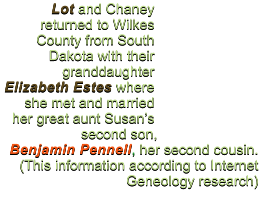
William "Judge" Green was born
1671 in Rippingdale, County Lincoln,
England. He was 20 years old when he
left England for America. Before marrying
he changed the spelling of the family
name to Green, dropping that last “e”. It
has not been confirmed in research as
yet, but it has been suggested that
William’s mother, Elizabeth Arnold may
have died in child birth when William was
born.
Willam met and married
Joanna Burroughs
Reeder in 1692 in
Newtown, Middlesex
County, New Jersey.
He became an honored
and well respected
judge. William died
June 16, 1722 and was
buried 2 days later at
Ewing Presbyterian
Cemetery, Trenton, 100
Scotch Road,
Hunterdon County,
New Jersey. You can
view William’s original
will here or you can read the full
text here. Joanna was born about 1674
in Newton Long Island New York and
preceeded him in death in 1721. She was
originally buried beside him until his
grave was moved many years later. It is
now believed her grave lies beneath the
current sanctuary.
Geoffrey De La Zouche, was born in France in 1126. He married Hawisa Fergant of
Brittany. They had two sons, Eudes II and Alan. many years later Geoffrey remarried after
Hawisa died and had at least one son, Alexander, by his new wife. Geoffrey died in 1187.
(Henry Bollinbroke the Earl of Hereford was crowned Henry IV, king of England in October of
that same year . There is a scene in Shakespear’s Richard II, Act I and II, depicting this
although not sympathetic toward the "conspirators". Shakespeare did not let actual historical
fact interfere with a good story, however.)
*Henry "6th Lord of Boketon" De Grene (wikipedia) was
born 1310 in Boughton (Boketon). He had the title of Sir Henry de
Green, Lord of Broughton. In 1345 he was sergeant-at-Law at
England. In 1354 he was Justice of the King's Bench at England.
He was excommunicated by the Pope for
pronouncing judgement against the bishop
of Ely. Between 24 May 1361 and 28 Oct
1365 he was Chief Justice of England
(appt. by King Edward III) and between
1363 and 1364 he was Speaker of the
House of Lords in two Parliaments. He
was one of King Edward III’s most trusted
advisors and the foremost lawyer of his day.
Sherriff of Northampton(1331 to 1332 and 1343) in the early part of the
reign of Edward III. He was also listed in the "Men of the Liberty of the Cinque Ports"
(given tax exempt status). 1334 he was also counted in the Lathe of Eyllesford (Aylesford),
Hundred of Hoo. 1336 to 1343 Sir Thomas was a Member of Parliament at
Northamptonshire, England. Lucie died 23 OCT 1326 and Thomas died circa 1352. (REF:
"Americans of Royal Descent" by Charles Browning).

Sir Henry's rank would not permit his pleading before the bar, but he put all his mental
acumen and legal knowledge at his royal master's command. He was a Commissioner to
examine certain abuses of which there was great complaint. He held several positions,
titles and appointments and always remained employed with special trust and authority
under the ministers that the king had left to govern the land in all the wars he had made
in France in 1364 and finally became the King's nearest Counsel(State Cabinet). And
such was his good fortune, he left to his posterity one of the most considerable estates of
that age. He died possessed of his ancient manor of Buckton, of Greene's Norton, East
Neaston, Heydmon Court, Heybourn, Ashby Mares, and Dodington, with lands in
Whittlebury, Paulsbury, and Northampton; the lordships of Drayton, Luffwich, Pesford,
Islip, Shipton, Wolston, Wamingdon, Chalton, Houghton, Boteahaseall, with lands in
Harringsworth, Harrowden, Hardwich, Raunds, Ringstead, Titchmarsh, Warrington, and
sundry other places. His second marriage was to Katherine Drayton, daughter of Sir
Simon Drayton of Drayton. He purchased Norton Davey for 20 shillings in 1359 which
became Greens Norton. He died August 6, 1369 and was buried in the church in
Boughton in Northamptonshire.
father upon the elder Henry’s death in 1369. He was executed on
July 24, 1399 by Henry Bolinbroke, who had been exiled when
King Richard II seized the throne. And on the adivce of Henry, Sir
John Bussy and Sir William Bagot, King Richard had confiscated
all of Bolinbroke’s lands. It was after Bolinbroke reclaimed his
throne he imprisoned both Henry and Bussy and then had them
beheaded at Bristol Castle.
*Sir Thomas de Grene, Knight and Lord of Isham, was born
1373 in Greene's Norton, County Northampshire,
England, and died December 14,
1417 in Greene's Norton, County
Northampshire, England. He married
Ela (Mallory) Malorie Abt. 1405
probably in Gillingham, County
Dorset. They had only one known
child, a son.
The GREENE family was a branch of the de la Zouche* family of whom Gibbon,
the historian, said that they had the most royal blood and the most strain of royal
blood in all Europe. The Greene's(originally de Grene) at one time were the largest
land owners in all England. They were over fifty times descent of Charlemagne
(known as 'Charles the Great, King of the Franks and Emperor of the West'), the
greatest man of a thousand years.
Through the Royal Welsh line, they claimed a double infusion of Jewish blood -- one line
from Aaron, the first High Priest, who was elder brother of Moses; the other from King David
himself. Queen Victoria of the same blood firmly believed this. A dozen titular saints, a
dozen signers of the Magna Charta, and over thirty crusaders were in this descent.
*John "3rd Baron de Boketon" De Grene De Boketon was
Christian and a knight born 1232 Boughton, County Northampton and was married to Alice
Notes DeBottisham. When Prince Edward set forth on the last crusade of the Holy War in
1271, Sir John de Grene de Boketon was of the rank, position, and age that entitled him to
accompany the prince into battle. During this crusade, the prince and Sir John became
close friends until Sir John died in Palestine in 1271, leaving a young son, Thomas, in
England. When Prince Edward became King Edward I in 1272, he bestowed the title of Lord
on the infant child, Thomas, in honor of the gallant service and friendship of Sir John.
Sir Robert Grene, Knight, Gentleman and Lord of Bowridge Hall, was born
around 1442 in Bowridge Hall, Gillingham, County Dorset, England.
Ancestry.com claims he died in 1520.
Following was Sir Robert "Lord of
Bowridge Hill" Grene, gentleman, born in
1499. He married Elizabeth Worgg, born circa
1503. The were married around early 1520. Their 1st child
listed as born during their 1st year of marriage. He re-
purchased the estate of Bowridge Hall, at Gillingham in
Dorsetshire, the family seat of the three preceding
generations. He died on October 2, 1563 at the age of 64.
Richard "of Stanfford Ryvera" Greene born 1527. He married Joan Converse in
1550 and died May 3, 1608. Joan was born Abt. 1534 in County Essex, England. She died
in 1606. Richard and Joan are buried in the family cemetery of Saint Mary the Virgin Parish
Church Cemetery. They had at least 8 known children,
(Note” Richard was also the great-great-great-great grandfather of Maj. General Nathanael
Greene, who commanded the Southern Continental Army against Gen. Cornwalis.)
(John Greene, son of Thomas, was sent, in 1483, by King Richard III as a messenger bearing a
letter from the King to Sir Robert Brackenbury who was then the keeper of the Tower of London.
In this letter the King gave orders that his two nephews, "the little Princes in the Tower," should be
put to death.
Although this iniquitous command was later obeyed by another governor of the Tower, Sir Robert
refused to commit murder at his sovereign's behest, and sent his message of refusal back to the
King by John Greene.
It is a tradition that when King Henry VII came to the throne he bore enmity to this John Greene
because he had played (only) the part of a messenger for Richard III in the later's wicked designs,
and that John Greene fled from England lest he be captured by the King.
It is said that "John the Fugitive" returned to England and for safety assumed the name of John
Clarke. Despite his change of name, the identity of John Greene, the Fugitive was discovered,
and he again fled from England, his further history being unknown although he is said to have
died in 1486 at the family home at Drayton.
Source: "The Greene Family and Its Branches", by Lora S. La Mance, Mayflower Publishing
Company, Floral Park, NY, 1904, p 34; Gaylord Green, Green/Greene Genealogy, Vol 13;
Denny1P@aol.com; Ancestry.com File 96135.exe; FamilySearchØ Ancestral File v4.19;)

Dr. John "Bridgeford Hill" Greene,
Sr., born July 28, 1570 in Bowridge Hill,
Gillingham, County Dorset, England and
was christened June 20,1568 at Northill
Chapel, County Bedford. He was listed as
a baker in Finchley, County Middlesex,
England in 1585. He married Agnes
Greene between 1585 and 1590 and died
July 26, 1604.
John "of Pinchbeck" Greene was
born 1591 in Pinchbeck, County Lincoln,
England. On Feb 6, 1616 he married
Bettrus (Beatrice) Tebbe. He died
sometime after 1626 in England.
William "of Pinchbeck" Greene
was born Aug 22, 1624 in Pinchbeck,
County Lincoln, England. He married
Annis Stanfield on 22 Nov 1649. He died
September 14, 1658 and was buried in
County, Lincoln.
Richard "of Hunterdon" Greene
was born in Pinchbeck, County Lincoln in
June 1655. He married first Elizabeth
Arnold who died early, probably in
childbirth. He then married Anne Quincey
(born 1659) on Jul 13, 1686. Anne died
May 27, 1739.
There was a Richard Green, an English
Quaker who sailed to America aboard
“The Shield” commanded by Daniel
Towes. It was only the fourth ship known
to have delivered settlers to the west side
of the Delaware River. In 1678 on the
10th of December, the "Shield" arrived
from Hull. This was the first ship that had
ever ascended the river as far as
Burlington. Among the English colonists
who came on this vessel were Mahlon
Stacy, Thomas Lambert, Thomas Newell,
John Newbold, and Mr. Barnes, merchant
from Hull, Richard Green and John
Heyers. It cannot be confirmed if this is
the same Richard or a different one. It is
believed Richard died before 1720 but
actual documentation of his death and
burial cannot be found at this time.
Source: History of the City of Trenton
New Jersey, by John O. Raum.
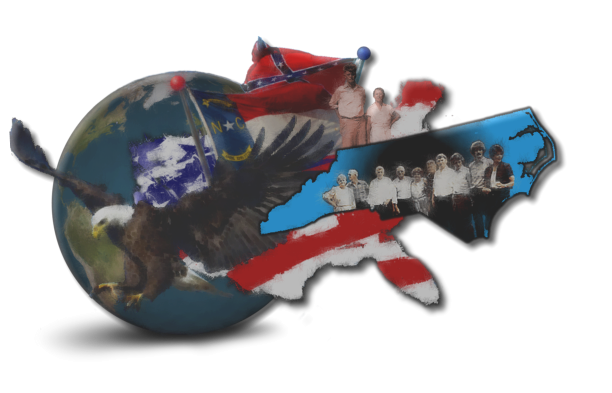
His son Richard Greene was born
March 17, 1740 in Hunterdon Co, NJ and
about 1762 he married Eleanor Sullivan
who was born in 1740. Together they had
10 children. Richard, along with two of his
brothers and two sisters, moved his family
away from the Jerssey Settlement and up
to an area of Watauga County which at the
time was still part of Wilkes County.
Richard settled in the area now known as
Blowing Rock. He purchased land and
built his home on what came to be known
as Greene Park where now the Green
Park Inn stands. At one time Richard
owned as much as 1100 acres which
included parts of where the town of
Blowing Rock now exists. Included in the
land he owned was Flat Top Mtn. Richard
died Feb 27, 1794 in Blowing Rock and
Eleanor died sometime before 1817.
Richard’s son Benjamin Green was
born in 1783 and married Mary (Polly)
Elrod, born 1788. Benjamin Died in 1855
and was followed five years later by Mary
in 1860
.
From the Blowing Rock web site - “The
first family to settle in
Blowing
Rock were the
Greens who were
established by the
mid 1800’s on a site
known as
( * indicates those ancestors buried in the family plot at St. John the
Baptist Cemetery, Boughton, County Northampshire, England )
Green Park.
There they helped
three prominent
business men from
Lenoir, NC, including
Civil War Veteran
Major George
Washington Findlay Harper open the
Green Park Inn in 1891.

There were a dozen decents from Alfred the Great and fifty from Wittekind.
They had the blood of Irish, Scotch, Saxon, English and Bohemian Kings;

*Walter "2nd Lord of Boketon" De Grene De
Boketon, Alexander’s son, was born about 1206
Boughton (Boketon), County Northampton, England in what
is now Greenes Norton, County Northampshire, England.
He served during the
Alexander De Greene De Boketon,
born around 1181 in Harrington, County
Northamptonshire, England, is the first
Lord De Greene. He is the fountainhead
of the Greene line and received his power
and titles as a reward from King John in
1202. He was a Knight of King John's
court and the great-grandson one of the
Norman Nobles who invaded England with William the
Conqueror in 1066. John bestowed the Estate of
Boughton in Northhampton as a
reward for going to Normandy in
1201 and putting down the uprising
of Count De La March.
Jeremiah "of Linwood" Greene was
born Feb. 1, 1710 in Hunterdon County,
New Jersey. He married Joanna "Hannah"
Hunt, born 1712, in 1735 and eventually
moved his family to The Jersey
Settlement in North Carolina. In 1759 a
Cherokee uprising caused Sargeant
Jeremiah Green, with Captain Morgan
Bryan's scouts, to find and punish the
Indians. This "war" came to an end only
when British regular troops, combined
with a large South Carolina force and
assorted scouts destroyed many of the
Cherokee towns in 1760 and 1761.
(read the history of the Settlement here)
He died Jan. 12, 1763 in Jersey, Davidson
County, NC near the Yadkin River which is
now part of Linwood, NC
There is no
documentaion for the
location of Jeremiah’s
burial but it is believed
Joanna outlived him
since she is buried at
Silverstone Community Cemetery,
in Watagua County, North Carolina along
with some of her grown chidren and their
familes.
(The history of the Greene family traces back as many as another 60 to 70 generations to as far
back as 1200 BC. To view the list of most of those ancestors click here to view the pdf file)



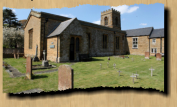





they came from ancient Parthian Emperors long before the time of our Lord Jesus Christ;
regular heathens; Russian rulers; French Kings; Constantine the Great; and Basil the Great,
the Byzantine Emperor.
Some information for the Greene family
was gathered here and also here.
Alan de Porhoet La
Zouche, Geoffrey’s elder
son, continued the De La
Zouche name and built it up to
some prominence. The two
family branches, Alan’s la
Zouche and Alexander’s De
Grene reconnected and
merged several generations
later. Alan was born in 1157
and died in 1190.











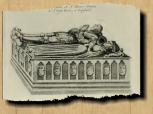
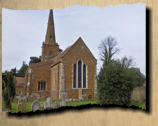

*Henry "Sir Lord of Drayton" De Grene (wikipedia)
(historyofparliamentonline) was born about 1347 at Greene's
Norton and married Mathilda De Mauduit in 1364 when she was
just ten years old. She was daughter and heiress of Thomas
Mauduit, by whom he had several children .He was Sir, Lord of
Drayton, Lord of Greens Norton, was a Knight of the Garter
and Lord Chancellor of England. He inherited the family home at
the time, DraytonHouse, from his
(Note: It may be possible that
Walter de Boketon (later De
GREENE) was also part of the
Sixth Crusade. He is listed in the
old roles of the 20th and 45th years
of Henry I). His title is documented
as Sir, Lord, 2nd Baron of Boketon
and Crusader for the Crown.)



Seventh Crusade led by
France as Christian armies
continued to attempt to regain
access to holy places in and
near Jerusalem.
Walter married about 1230
and died about 1275.
This event precipitated from the King taking the Count's state
arranged bride Isabelle in 1200. He had ordered his Nobles to
put down the uprising, but they refused. He confiscated their
properties and gave them to the loyal knights who performed
this task for him. The Boughton Estate was very large with the
ranking of a Baronage. 6,000 acres min. were required to have
this title. This property was much larger. It is said that at one
time the Greenes were the largest landowners in the kingdom.
Alexander assumed a surname of his chief estate. De Greene
De Boketon, i.e. the Lord of the Park of the Deer Enclosure. A
green in the early days was "a park". Boketon is an old, old
word meaning the bucks' (bokes) ton or paled-in enclosure.
For a long time De Greene De Boketon was used on all official
documents over time it was shortened to De Greene.
Alexander died in 1236. .
Our ancestors gave us what we needed to get to where we are
today. How we use that knowledge can make us or break us.




*Thomas "5th Lord of Boketon" De Grene followed in 1288 or 1292. Most historical
records indicate on October 23, in 1297 he married a distant cousin Lucie "Lady of
Boketon" La Zouche daughter of Lord Eudo La Zouche and Lady Millicent De Cantilupe.
She and her parents were also of Royal descent. Lady Lucie de la
Zouche was a direct descendant of Henry I of France on her mother’s
side. If the 1288 birth and 1297 marriage dates prove accurate, it would
make Thomas all of nine years old when he married Lucie. This could
have been an arranged marriage to rejoin the family branches and lock in
the royal blood line. Lucie’s grandfather, Alan La Zouche was a
benefactor of the Knights Templars, to whom he gave lands at Sibford,
and to the Belmeis family foundation of Buildwas Abbey. Thomas’ titles
included Sir, Lord of Broughton, 5th Baron Lord de Grene and High

(Family split and
re-connection
5 generations later)
Click for larger view
During the reign of Henry IV,
1422-1471, with the attendant
French wars, the Patriotic De
Greenes dropped the patrician
"De" as too Frenchy in sound for
Englishmen, as they now
considered themselves.


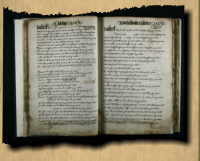











Our ancestors gave us what we needed to get to where we are
today. How we use that knowledge can make us or break us.



































